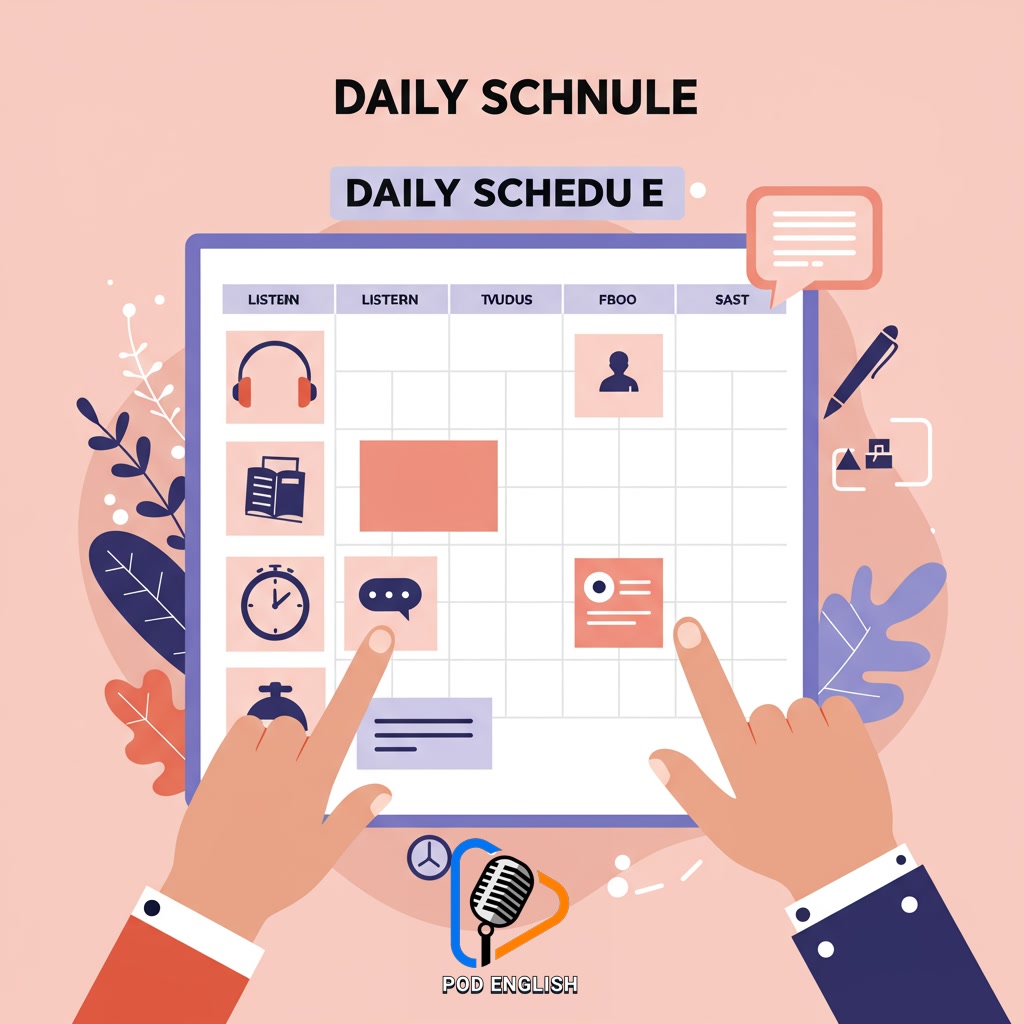Learn English
Master Your English Study: Setting Realistic Daily Practice Goals

This content guides you on mastering your English study by emphasizing the importance of setting realistic daily practice goals. It helps you establish achievable routines to ensure consistent progress. By focusing on practical daily targets, you can effectively enhance your English skills over time.
Table of Contents
- Section 1: The Power of Realistic Daily Goals in English Study
- Section 2: Assessing Your Current English Level and Available Time
- Section 3: Principles for Setting Achievable Daily Study Goals
- Section 4: Setting Specific Daily Goals for Core English Skills
- Section 5: Structuring Your Daily English Practice Routine
- Section 6: Tracking Progress and Staying Motivated Daily
- Section 7: Reviewing and Adapting Your Goals Over Time
Section 1: The Power of Realistic Daily Goals in English Study
Setting goals is crucial for any learning journey, especially when mastering English. However, the real power lies not just in having goals, but in making them realistic and daily. Instead of aiming for vague, large targets, focus on small, achievable tasks you can complete every single day. This approach prevents feeling overwhelmed and builds vital consistency. Completing a small goal each day creates a sense of accomplishment, which motivates you to continue. Over time, these consistent, small steps accumulate into significant progress. Realistic daily goals turn the daunting task of learning English into a manageable, rewarding habit, making your study more effective and sustainable.

The Power of Realistic Daily Goals in English Study
Section 2: Assessing Your Current English Level and Available Time
Following the idea of setting realistic daily goals, the essential first step is honestly evaluating two key factors: your current English proficiency and the actual amount of time you can consistently dedicate to studying each day. To assess your level, consider using online placement tests, reviewing your past study materials, or reflecting on your comfort level with different skills like speaking, listening, reading, and writing. Be specific about where you are strong and where you need improvement. Simultaneously, take a hard look at your daily schedule. Identify realistic blocks of time that you can commit *every single day*, even if it’s just 15 or 30 minutes. Factor in work, family, and other commitments. Overestimating your time or your current level will only lead to frustration. A realistic assessment forms the solid foundation upon which achievable daily goals can be built, ensuring steady, sustainable progress towards mastering English.

Assessing Your Current English Level and Available Time
Section 3: Principles for Setting Achievable Daily Study Goals
Building upon your honest evaluation of your current level and available time, the core principles for setting achievable daily study goals involve making them specific, measurable, attainable, relevant, and time-bound (SMART is a useful framework). Instead of vague goals like ‘study English,’ aim for ‘learn 10 new vocabulary words related to daily routines’ or ‘practice listening to a 5-minute podcast and summarize it.’ Break down larger tasks into smaller, manageable steps that fit comfortably within your allocated time. Consistency is key; it’s better to study for 20-30 focused minutes daily than to attempt a marathon session once a week. Ensure your goals align with your overall learning objectives and are realistic given your current commitments. Regularly review and adjust your goals as you progress.

Principles for Setting Achievable Daily Study Goals
Section 4: Setting Specific Daily Goals for Core English Skills
Building upon your honest evaluation of your current level and available time, the core principles for setting achievable daily study goals involve making them specific, measurable, attainable, relevant, and time-bound (SMART). To effectively apply this to your core English skills, specificity is key. Instead of a vague goal like ‘study English,’ define exactly what you will accomplish for listening, speaking, reading, and writing each day you study. For example, a specific reading goal might be ‘read one news article from BBC Learning English and identify five new vocabulary words,’ while a speaking goal could be ‘practice describing my day aloud for five minutes.’ Breaking down your study into these concrete, actionable tasks makes your progress tangible, easier to track, and ensures you dedicate focused effort to each essential skill, thereby building consistent improvement over time.

Setting Specific Daily Goals for Core English Skills
Section 5: Structuring Your Daily English Practice Routine
Building upon your honest evaluation of your current level and available time, the core principles for setting achievable daily study goals involve making them specific, measurable, attainable, releva… Translating these principles into action requires structuring your daily English practice effectively. This means allocating dedicated time slots for different activities based on your specific goals and available time. Instead of just thinking ‘I’ll study English today,’ plan exactly when and what you will study – perhaps 30 minutes of listening during your commute and 45 minutes focusing on grammar exercises in the evening. Varying your activities within the structure is crucial to engage different skills and maintain interest. Use tools like calendars, planners, or even simple to-do lists to visualize and track your scheduled tasks, making it easier to stick to your routine and build consistency over time.

Structuring Your Daily English Practice Routine
Section 6: Tracking Progress and Staying Motivated Daily
Consistent progress in English study hinges on effective daily tracking and maintaining motivation. To track your daily goals, consider simple methods like a checklist, a study journal, or a digital app where you mark off completed tasks. This visual record provides concrete evidence of your effort and achievement each day. Reviewing this progress regularly is a powerful motivator, showing you how far you’ve come. If you fall behind, don’t dwell on it; simply acknowledge it and refocus on the next day’s goals. Staying motivated also involves celebrating small wins – finishing a tough grammar exercise or understanding a new vocabulary word. Connect with your ‘why’ for studying English and remind yourself of your long-term aspirations. By consistently tracking your daily efforts and celebrating your achievements, you build momentum and reinforce the habit of dedicated study.
Tracking Progress and Staying Motivated Daily
Section 7: Reviewing and Adapting Your Goals Over Time
After establishing consistent tracking of your daily English practice, the next vital step is to regularly review and adapt your goals. Your learning journey isn’t static; it evolves based on your progress, challenges, and changing life circumstances. Take dedicated time each week or month to look at your tracking data and honestly assess what worked well and what didn’t. Perhaps you consistently missed your speaking goal, or found the vocabulary target overwhelming. Based on this review, be prepared to adjust your targets. This might mean modifying the duration of tasks, changing the focus areas, or experimenting with different study methods. Adapting your goals demonstrates flexibility and ensures your plan remains realistic, achievable, and motivating, preventing burnout and maintaining momentum for long-term skill development.

Reviewing and Adapting Your Goals Over Time













